Papers by Robert Hamm
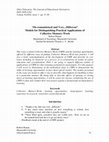
Other Education, 2020
This essay is about Collective Memory-Work (CMW) and the learning opportunities offered by differ... more This essay is about Collective Memory-Work (CMW) and the learning opportunities offered by different ways of putting Collective Memory-Work into practice. I will give a brief contextualisation of the development of CMW and describe its core tenets including its character as a process of reconstruction of results of earlier education and societalisation. Then I am going to unpack different models of applications of CMW for their learning potential for participants. For this purpose I will revert to illustrations of the methodical steps in CMW to demonstrate the shifts of learning opportunities in four ideal typical models. The models presented in the essay are meant to offer a way to describe what happens if something is done in a particular manner. By being able to describe effects of opening or closing down of learning opportunities, it will be easier for anyone considering the use of CMW to plan and conduct their own project against a background of emancipatory learning.
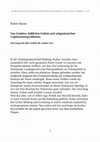
Von Zombies, häßlichen Entlein und zeitgenössischen Legitimationsproblemen.
Ein Gespräch über S... more Von Zombies, häßlichen Entlein und zeitgenössischen Legitimationsproblemen.
Ein Gespräch über Schule als sozialer Ort.
In der Arbeitsgemeinschaft Bildung, Kultur, Soziales einer namentlich hier nicht genannten Partei wurde vor kurzem eine Perspektivdebatte eröffnet, mit dem Ziel rechtzeitig für die kommende Landtagswahl eine Parteiplattform zur Schulpolitik zu erstellen. Dazu sollte ein plakativer Slogan gefunden werden, der möglichst prägnant die Grundausrichtung der schulpolitischen Position der Partei wiedergibt. Beim ersten Treffen wurde ein Vorschlag für einen solchen Slogan entwickelt. Kai war als Delegierter seines Kreisverbandes an dieser Diskussion beteiligt. Er war mit dem Resultat der Diskussion ganz zufrieden. Der Vorschlag lautete: Schule muß sozialer Lernort werden! Weil Kai aber, wie er selber sagt, Politik mit Vorsicht betreibt, hatte er seine Freundin Katja um Rückmeldung gebeten. Katja verwaltete das Archiv Bildung und Erziehung in einem wiederum namentlich nicht genannten Institut. Nun trafen sich Kai und Katja im Archiv. Kai erzählte ihr mit einem gewissen Stolz von dem erarbeiteten Slogan.
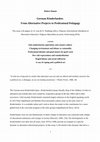
This essay will appear in the Palgrave International Handbook of Alternative Education (forthcomi... more This essay will appear in the Palgrave International Handbook of Alternative Education (forthcoming 2016). It attends to the process of professionalisation and institutionalisation of formerly anti-authoritarian educational projects in Germany since the 1970s. These projects (called 'Kinderlaeden') developed from a status of counter-cultural educational experiments into established providers of educational services well into the mainstream of society.
The essay looks at the perspective of the workers (educators) in these projects. In a reciprocal process interests of educators and parents who were originally members of a by definition common project drift apart over time. As a consequence the logic of bourgeois forms of intercourse, waged labour, labour as commodity can get a hold again in the relationships within the projects. Eventually education (pedagogy) is reaffirmed as a special trade exercised correctly only by specialists.
Some results of a comparative study on reflective practice of teachers in Irish primary schools, ... more Some results of a comparative study on reflective practice of teachers in Irish primary schools, German mainstream schools and Free alternative schools.
The study was carried out as part of a research project on reflection processes of teachers on rituals/ritualisations in schools. See also: www.schoolandritual.com
I am providing here a longer article in which the method is explained and a documentation of its ... more I am providing here a longer article in which the method is explained and a documentation of its application in the course of the research on reflections of teachers on rituals/ritualisations is included. The article is also accessible on www.schoolandritual.com
Beitrag zur Diskussion des Sonderdrucks von Erwägen - Wissen - Ethik 23 (2012 ) 2,
in response t... more Beitrag zur Diskussion des Sonderdrucks von Erwägen - Wissen - Ethik 23 (2012 ) 2,
in response to Burckhard Dücker
Kinderladen-Entwicklung: Eindrücke aus Frankfurt und Hessen
- Freie Kinderarbeit - Professionali... more Kinderladen-Entwicklung: Eindrücke aus Frankfurt und Hessen
- Freie Kinderarbeit - Professionalisierung - Institutionalisierung
Text von 1997
Books by Robert Hamm
The potential of Collective Memory-Work as a method of learning, 2021
Over 30 years the Marxist-Feminist method of Collective Memory-Work has been applied and adapted ... more Over 30 years the Marxist-Feminist method of Collective Memory-Work has been applied and adapted in a multitude of projects across the globe. Collective Memory-Work dissolves boundaries between research and learning. As a method it is interdisciplinary, deliberately inchoate, and therefore alive. (Frigga Haug)
This book explains traditions and trajectories in adaptations of Collective Memory-Work. It encourages to experiment with the method, and to appropriate history from a position of everyday life.
Reader Collective Memory-Work, 2021
The Reader Collective Memory-Work is meant to foster further exchange about Collective Memory-Wor... more The Reader Collective Memory-Work is meant to foster further exchange about Collective Memory-Work, its use and usefulness, methodological questions, aspects of its adaptation/s, critical elements found in CMW, exemplary applications in various fields of practice and research.
Included in the Reader are: first-time English translations of texts by the groups involved in the Frauenformen projects with Frigga Haug; reprints of chapters on Collective Memory-Work that are helpful to understand trajectories of its development and adaptations; contributions about connections and perspectives for applications of Collective Memory-Work and discussions of method and methodology.

Actors in institutional educational are expected to take part in manifold activities that are bes... more Actors in institutional educational are expected to take part in manifold activities that are best understood as ritualised practices. This is true for teachers, pupils, and students alike. These practices are inherently linked to areas of social order, norms, values, belief systems. Reflecting on these practices can be a rather difficult task.
In "Negotiating Legitimacy - Ritual and Reflection in School" a comprehensive overview is provided about ritual analysis as a tool to approach educational practice.
The book is based on a research project on reflection processes of primary school teachers on rituals and ritualisations. Teachers from Irish primary schools, German mainstream schools and German free alternative schools took part in it. The free alternative schools offered a field where the social order is based on a radical democracy without formal hierarchies. Here children are not subjected to a set curriculum, they are supposed to be free to decide what, when, where, and with whom they want to do. A general sketch of the free alternative schools is included in the book. The three different school settings account for three different ritual cultures, and there is information available on this issue in the book, too.
As the research project dealt with reflection processes of teachers it was necessary to employ a concept of reflection. Processual scale, functional and orientational character are common models for a classification of reflection processes. However there are limitations in these models. In "Negotiating Legitimacy - Ritual and Reflection in School" it is suggested to enhance the figures of thought applied to concepts of reflection. The character of reflection as a social act is systematically taken into account. In the book extensive coverage is given to concrete reflection processes of teachers on their ritual practices.
Institutional education is deeply permeated by numerous ritual practices. Within any social setting changes in ritual practices happen constantly via mimetic processes. That is also true for educational institutions. Strategic interventions in negotiations of power relations in form of ritualisation, avoiding explicit speech and narrative, are ongoing at all times. They can be moved on by pupils and teachers alike, sometimes by parents, by principals, simply by anyone who is physically in the field. Any of those moves brings about changes.
But alternatives can and should be more than changes happening in lieu of explicit logical speculation. Critically thinking about rituals in school will inevitably lead into thinking about the institutional character of school, its historic roots and trajectories, its current position in society. The question of critical reflection is taken up in a separate chapter within the book also.
Teachers find themselves in a pivotal position in the institution. Their practice is essential to making school real. Accepting critical questions about their acting in ritualised practices in schools and searching for answers will open the route for changes that are consciously enacted. "Negotiating Legitimacy - Ritual and Reflection in School" can help to develop such critical questions.

Auch in einem kleinen Ort wie Langen gab es Menschen,
die hofften, durch den Faschismus zu relati... more Auch in einem kleinen Ort wie Langen gab es Menschen,
die hofften, durch den Faschismus zu relativem Wohlstand,
zu Einfluß, zu Macht zu kommen. Manche erhofften sich
nur einen Arbeitsplatz, eine gesicherte Existenz, andere
sahen die große Karriere vor sich. Den Preis dafür, die
Entmenschlichung der Beziehungen, den Anspruch auf
totale Kontrolle aller Lebensbereiche, trugen sie gerne.
Ja, für viele bedeutete das gar keinen Verlust.
Für diejenigen aber, die im Widerstand aktiv gegen das
System der Barbarei eintraten und diejenigen, die auf-
grund der absurden Rassevorstellungen der Nazis als
minderwertig deklariert wurden, war der Preis oft uner-
träglich hoch. Viele bezahlten mit dem Leben. Und die, die
das Grauen der faschistischen Lager, die Deportationen,
Flucht und Emigration überlebten, trugen auch nach dem
Ende des Terrorregimes schwer an den Wunden, die ihnen
geschlagen wurden.
In diesem Buch geht es um Menschen, die sich dem
Faschismus aktiv entgegengestellt haben – und um
solche, die als Nazis aktiv waren.
Conference Presentations by Robert Hamm
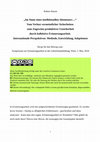
Vom Verlust vermeintlicher Sicherheiten zum Zugewinn produktiver Unsicherheit durch kollektive Er... more Vom Verlust vermeintlicher Sicherheiten zum Zugewinn produktiver Unsicherheit durch kollektive Erinnerungsarbeit. Internationale Perspektiven: Methode, Entwicklung, Adaptionen Skript für den Beitrag zum: Symposium zur Erinnerungsarbeit in der LehrerInnenbildung, Wien, 3. Mai, 2018 Diese Veröffentlichung erfolgt unter der Creative-Commons-Lizenz: CC-BY-NC-ND Das Werk darf vervielfältigt, verbreitet und öffentlich zugänglich gemacht werden. BY (Namensnennung): Sie müssen den Namen des Autors nennen, wodurch aber nicht der Eindruck entstehen darf, Sie oder die Nutzung des Werkes durch Sie wurden entlohnt. NC (Keine kommerzielle Nutzung): Dieses Werk darf nicht für kommerzielle Zwecke verwendet werden. ND (Keine Abwandlung): Die vorliegende Public License gewährt keine Erlaubnis, abgewandeltes Material weiterzugeben. In Erinnerungsarbeit wird mit aufgeschriebenen Erinnerungen gearbeitet. Es werden kurze Szenen -häufig zu alltäglichen Erlebenissen -geschrieben und dann analysiert. Kann man also sagen, Erinnerungsarbeit ist Textarbeit? Oder gehört da noch mehr dazu? Hierzu eine Skizze, die sozusagen das Gesamtpaket darstellt: 1 2
Presentation and workshop @ the National Conference of Free Alternative Schools in Berlin 23.- 25... more Presentation and workshop @ the National Conference of Free Alternative Schools in Berlin 23.- 25. 9. 2011;
Summary of workshop.
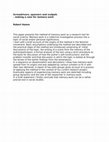
As a research method memory-work deserves much more attention than it enjoys currently. The metho... more As a research method memory-work deserves much more attention than it enjoys currently. The method originates from the West-German feminist movement of the 1970’s and 1980’s. It was developed as a collective research tool to bring the experiences of women which were found to be absent in scientific discourse into debate.
The method in a nutshell:
i) Group members discuss the topic at hand to understand their individual points of view on the matter
ii) Members write stories of an event relating to the topic which they experienced themselves.
iii) Stories are analysed by the group in a set procedure of ‘deconstruction’.
iv) Results of the text-analyses (step iii) and initial discussion (step i) are set in relation to each other.
The intertwined process of giving meaning to one’s own experiences and struggling for social recognition of one’s own image in a specific historical and material situation come to the fore when the material generated by participants is analysed. The reconstruction of the scenes gives rise to new interpretations and opens the view for alternative routes of action.
As a research tool memory work has been used in feminist studies, but also on topics like migration, media experiences, teacher training, sport, tourist experiences.
As a method developed from within an emancipative social movement memory-work offers a tool for social science in an enhanced attempt to understand the human essence in its reality as the ensemble of social relations and effectively help in generating articulated alternatives.
Uploads
Papers by Robert Hamm
Ein Gespräch über Schule als sozialer Ort.
In der Arbeitsgemeinschaft Bildung, Kultur, Soziales einer namentlich hier nicht genannten Partei wurde vor kurzem eine Perspektivdebatte eröffnet, mit dem Ziel rechtzeitig für die kommende Landtagswahl eine Parteiplattform zur Schulpolitik zu erstellen. Dazu sollte ein plakativer Slogan gefunden werden, der möglichst prägnant die Grundausrichtung der schulpolitischen Position der Partei wiedergibt. Beim ersten Treffen wurde ein Vorschlag für einen solchen Slogan entwickelt. Kai war als Delegierter seines Kreisverbandes an dieser Diskussion beteiligt. Er war mit dem Resultat der Diskussion ganz zufrieden. Der Vorschlag lautete: Schule muß sozialer Lernort werden! Weil Kai aber, wie er selber sagt, Politik mit Vorsicht betreibt, hatte er seine Freundin Katja um Rückmeldung gebeten. Katja verwaltete das Archiv Bildung und Erziehung in einem wiederum namentlich nicht genannten Institut. Nun trafen sich Kai und Katja im Archiv. Kai erzählte ihr mit einem gewissen Stolz von dem erarbeiteten Slogan.
The essay looks at the perspective of the workers (educators) in these projects. In a reciprocal process interests of educators and parents who were originally members of a by definition common project drift apart over time. As a consequence the logic of bourgeois forms of intercourse, waged labour, labour as commodity can get a hold again in the relationships within the projects. Eventually education (pedagogy) is reaffirmed as a special trade exercised correctly only by specialists.
The study was carried out as part of a research project on reflection processes of teachers on rituals/ritualisations in schools. See also: www.schoolandritual.com
in response to Burckhard Dücker
- Freie Kinderarbeit - Professionalisierung - Institutionalisierung
Text von 1997
Books by Robert Hamm
This book explains traditions and trajectories in adaptations of Collective Memory-Work. It encourages to experiment with the method, and to appropriate history from a position of everyday life.
Included in the Reader are: first-time English translations of texts by the groups involved in the Frauenformen projects with Frigga Haug; reprints of chapters on Collective Memory-Work that are helpful to understand trajectories of its development and adaptations; contributions about connections and perspectives for applications of Collective Memory-Work and discussions of method and methodology.
In "Negotiating Legitimacy - Ritual and Reflection in School" a comprehensive overview is provided about ritual analysis as a tool to approach educational practice.
The book is based on a research project on reflection processes of primary school teachers on rituals and ritualisations. Teachers from Irish primary schools, German mainstream schools and German free alternative schools took part in it. The free alternative schools offered a field where the social order is based on a radical democracy without formal hierarchies. Here children are not subjected to a set curriculum, they are supposed to be free to decide what, when, where, and with whom they want to do. A general sketch of the free alternative schools is included in the book. The three different school settings account for three different ritual cultures, and there is information available on this issue in the book, too.
As the research project dealt with reflection processes of teachers it was necessary to employ a concept of reflection. Processual scale, functional and orientational character are common models for a classification of reflection processes. However there are limitations in these models. In "Negotiating Legitimacy - Ritual and Reflection in School" it is suggested to enhance the figures of thought applied to concepts of reflection. The character of reflection as a social act is systematically taken into account. In the book extensive coverage is given to concrete reflection processes of teachers on their ritual practices.
Institutional education is deeply permeated by numerous ritual practices. Within any social setting changes in ritual practices happen constantly via mimetic processes. That is also true for educational institutions. Strategic interventions in negotiations of power relations in form of ritualisation, avoiding explicit speech and narrative, are ongoing at all times. They can be moved on by pupils and teachers alike, sometimes by parents, by principals, simply by anyone who is physically in the field. Any of those moves brings about changes.
But alternatives can and should be more than changes happening in lieu of explicit logical speculation. Critically thinking about rituals in school will inevitably lead into thinking about the institutional character of school, its historic roots and trajectories, its current position in society. The question of critical reflection is taken up in a separate chapter within the book also.
Teachers find themselves in a pivotal position in the institution. Their practice is essential to making school real. Accepting critical questions about their acting in ritualised practices in schools and searching for answers will open the route for changes that are consciously enacted. "Negotiating Legitimacy - Ritual and Reflection in School" can help to develop such critical questions.
die hofften, durch den Faschismus zu relativem Wohlstand,
zu Einfluß, zu Macht zu kommen. Manche erhofften sich
nur einen Arbeitsplatz, eine gesicherte Existenz, andere
sahen die große Karriere vor sich. Den Preis dafür, die
Entmenschlichung der Beziehungen, den Anspruch auf
totale Kontrolle aller Lebensbereiche, trugen sie gerne.
Ja, für viele bedeutete das gar keinen Verlust.
Für diejenigen aber, die im Widerstand aktiv gegen das
System der Barbarei eintraten und diejenigen, die auf-
grund der absurden Rassevorstellungen der Nazis als
minderwertig deklariert wurden, war der Preis oft uner-
träglich hoch. Viele bezahlten mit dem Leben. Und die, die
das Grauen der faschistischen Lager, die Deportationen,
Flucht und Emigration überlebten, trugen auch nach dem
Ende des Terrorregimes schwer an den Wunden, die ihnen
geschlagen wurden.
In diesem Buch geht es um Menschen, die sich dem
Faschismus aktiv entgegengestellt haben – und um
solche, die als Nazis aktiv waren.
Conference Presentations by Robert Hamm
Summary of workshop.
The method in a nutshell:
i) Group members discuss the topic at hand to understand their individual points of view on the matter
ii) Members write stories of an event relating to the topic which they experienced themselves.
iii) Stories are analysed by the group in a set procedure of ‘deconstruction’.
iv) Results of the text-analyses (step iii) and initial discussion (step i) are set in relation to each other.
The intertwined process of giving meaning to one’s own experiences and struggling for social recognition of one’s own image in a specific historical and material situation come to the fore when the material generated by participants is analysed. The reconstruction of the scenes gives rise to new interpretations and opens the view for alternative routes of action.
As a research tool memory work has been used in feminist studies, but also on topics like migration, media experiences, teacher training, sport, tourist experiences.
As a method developed from within an emancipative social movement memory-work offers a tool for social science in an enhanced attempt to understand the human essence in its reality as the ensemble of social relations and effectively help in generating articulated alternatives.
Ein Gespräch über Schule als sozialer Ort.
In der Arbeitsgemeinschaft Bildung, Kultur, Soziales einer namentlich hier nicht genannten Partei wurde vor kurzem eine Perspektivdebatte eröffnet, mit dem Ziel rechtzeitig für die kommende Landtagswahl eine Parteiplattform zur Schulpolitik zu erstellen. Dazu sollte ein plakativer Slogan gefunden werden, der möglichst prägnant die Grundausrichtung der schulpolitischen Position der Partei wiedergibt. Beim ersten Treffen wurde ein Vorschlag für einen solchen Slogan entwickelt. Kai war als Delegierter seines Kreisverbandes an dieser Diskussion beteiligt. Er war mit dem Resultat der Diskussion ganz zufrieden. Der Vorschlag lautete: Schule muß sozialer Lernort werden! Weil Kai aber, wie er selber sagt, Politik mit Vorsicht betreibt, hatte er seine Freundin Katja um Rückmeldung gebeten. Katja verwaltete das Archiv Bildung und Erziehung in einem wiederum namentlich nicht genannten Institut. Nun trafen sich Kai und Katja im Archiv. Kai erzählte ihr mit einem gewissen Stolz von dem erarbeiteten Slogan.
The essay looks at the perspective of the workers (educators) in these projects. In a reciprocal process interests of educators and parents who were originally members of a by definition common project drift apart over time. As a consequence the logic of bourgeois forms of intercourse, waged labour, labour as commodity can get a hold again in the relationships within the projects. Eventually education (pedagogy) is reaffirmed as a special trade exercised correctly only by specialists.
The study was carried out as part of a research project on reflection processes of teachers on rituals/ritualisations in schools. See also: www.schoolandritual.com
in response to Burckhard Dücker
- Freie Kinderarbeit - Professionalisierung - Institutionalisierung
Text von 1997
This book explains traditions and trajectories in adaptations of Collective Memory-Work. It encourages to experiment with the method, and to appropriate history from a position of everyday life.
Included in the Reader are: first-time English translations of texts by the groups involved in the Frauenformen projects with Frigga Haug; reprints of chapters on Collective Memory-Work that are helpful to understand trajectories of its development and adaptations; contributions about connections and perspectives for applications of Collective Memory-Work and discussions of method and methodology.
In "Negotiating Legitimacy - Ritual and Reflection in School" a comprehensive overview is provided about ritual analysis as a tool to approach educational practice.
The book is based on a research project on reflection processes of primary school teachers on rituals and ritualisations. Teachers from Irish primary schools, German mainstream schools and German free alternative schools took part in it. The free alternative schools offered a field where the social order is based on a radical democracy without formal hierarchies. Here children are not subjected to a set curriculum, they are supposed to be free to decide what, when, where, and with whom they want to do. A general sketch of the free alternative schools is included in the book. The three different school settings account for three different ritual cultures, and there is information available on this issue in the book, too.
As the research project dealt with reflection processes of teachers it was necessary to employ a concept of reflection. Processual scale, functional and orientational character are common models for a classification of reflection processes. However there are limitations in these models. In "Negotiating Legitimacy - Ritual and Reflection in School" it is suggested to enhance the figures of thought applied to concepts of reflection. The character of reflection as a social act is systematically taken into account. In the book extensive coverage is given to concrete reflection processes of teachers on their ritual practices.
Institutional education is deeply permeated by numerous ritual practices. Within any social setting changes in ritual practices happen constantly via mimetic processes. That is also true for educational institutions. Strategic interventions in negotiations of power relations in form of ritualisation, avoiding explicit speech and narrative, are ongoing at all times. They can be moved on by pupils and teachers alike, sometimes by parents, by principals, simply by anyone who is physically in the field. Any of those moves brings about changes.
But alternatives can and should be more than changes happening in lieu of explicit logical speculation. Critically thinking about rituals in school will inevitably lead into thinking about the institutional character of school, its historic roots and trajectories, its current position in society. The question of critical reflection is taken up in a separate chapter within the book also.
Teachers find themselves in a pivotal position in the institution. Their practice is essential to making school real. Accepting critical questions about their acting in ritualised practices in schools and searching for answers will open the route for changes that are consciously enacted. "Negotiating Legitimacy - Ritual and Reflection in School" can help to develop such critical questions.
die hofften, durch den Faschismus zu relativem Wohlstand,
zu Einfluß, zu Macht zu kommen. Manche erhofften sich
nur einen Arbeitsplatz, eine gesicherte Existenz, andere
sahen die große Karriere vor sich. Den Preis dafür, die
Entmenschlichung der Beziehungen, den Anspruch auf
totale Kontrolle aller Lebensbereiche, trugen sie gerne.
Ja, für viele bedeutete das gar keinen Verlust.
Für diejenigen aber, die im Widerstand aktiv gegen das
System der Barbarei eintraten und diejenigen, die auf-
grund der absurden Rassevorstellungen der Nazis als
minderwertig deklariert wurden, war der Preis oft uner-
träglich hoch. Viele bezahlten mit dem Leben. Und die, die
das Grauen der faschistischen Lager, die Deportationen,
Flucht und Emigration überlebten, trugen auch nach dem
Ende des Terrorregimes schwer an den Wunden, die ihnen
geschlagen wurden.
In diesem Buch geht es um Menschen, die sich dem
Faschismus aktiv entgegengestellt haben – und um
solche, die als Nazis aktiv waren.
Summary of workshop.
The method in a nutshell:
i) Group members discuss the topic at hand to understand their individual points of view on the matter
ii) Members write stories of an event relating to the topic which they experienced themselves.
iii) Stories are analysed by the group in a set procedure of ‘deconstruction’.
iv) Results of the text-analyses (step iii) and initial discussion (step i) are set in relation to each other.
The intertwined process of giving meaning to one’s own experiences and struggling for social recognition of one’s own image in a specific historical and material situation come to the fore when the material generated by participants is analysed. The reconstruction of the scenes gives rise to new interpretations and opens the view for alternative routes of action.
As a research tool memory work has been used in feminist studies, but also on topics like migration, media experiences, teacher training, sport, tourist experiences.
As a method developed from within an emancipative social movement memory-work offers a tool for social science in an enhanced attempt to understand the human essence in its reality as the ensemble of social relations and effectively help in generating articulated alternatives.